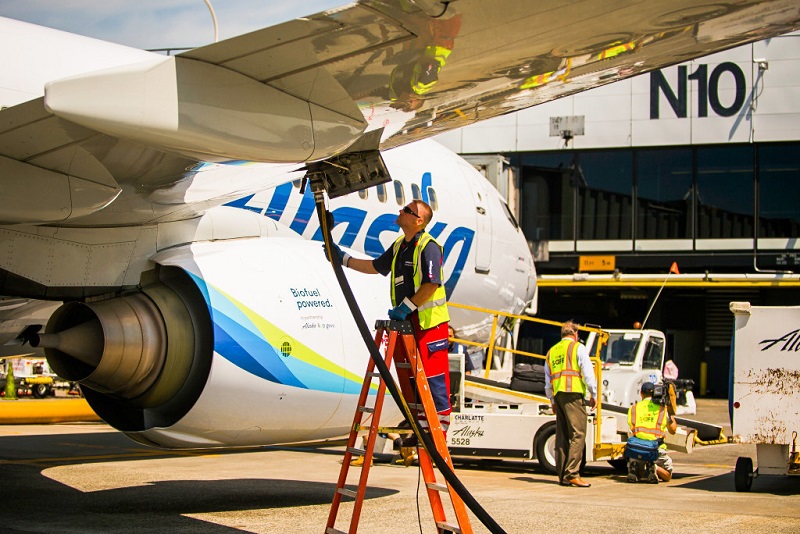Boeing and Airbus boost support for North American sustainable fuels
16 July, 2021
4 min read
By joining our newsletter, you agree to our Privacy Policy


Sustainable aviation fuel (SAF) production is getting a much-needed boost in North America with separate agreements between producers and major aircraft manufacturers Boeing and Airbus.
Both planemakers are promising to work on accelerating SAF development — Airbus in Canada and Boeing on its home turf in the US.
Although electric and hybrid aircraft are being developed for short-haul travel, sustainable aviation fuels are a key to the aviation industry cutting its CO2 emissions and are seen as the best options for long-haul flight for several decades.
READ: United hopes to fly electric aircraft by 2026.
The fuels can offer a reduction of up to 80 percent in life-cycle carbon emissions but governments have been slow to join the program and restraints include a lack of production facilities and high prices.
Boeing is partnering with SkYNRG Americas, a new US offshoot of the Dutch company, to promote the use of SAFs and will invest in an existing production project involving Alaska Airlines.
Alaska and SkyNRG signed an MOU in April that will initially focus on the development of SAF production facilities servicing airports in the US west.
The facilities will use municipal solid waste and other waste products as feedstocks and incorporate green hydrogen and renewable energy to cut their carbon footprint.
SkyNRG says its SAF will reduce greenhouse gas emissions by more than 80 percent, burn cleaner in jet engines, and reduce particulate matter by 90 percent.
It notes there are significant volumes of municipal solid waste available throughout the U.S that ends up buried in landfills but is an attractive SAF feedstock.
Boeing said it would work with Sky NRG and SkyNRG Americas to accelerate SAF development globally, focusing on boosting production capacity, building awareness and engaging stakeholders such as airlines, governments and environmental organisations.
"Sustainable aviation fuels are safe, proven and offer the greatest potential to reduce our industry's carbon emissions in the near, medium and long term," said Boeing chief sustainability officer Chris Raymond.
"This partnership is an important milestone on our journey to decarbonize aerospace, while ensuring that its societal and economic benefits are available to people everywhere."
Airbus has signed an MOU with Montreal-based SAF + Consortium to collaborate with major Canadian aviation industry players “to develop a concrete solution that will make low-carbon flying a reality”.
The SAF+ Consortium brings together a number of key Quebec-based aerospace companies and research institutions, such as Air Transat, Hydro-Quebec, Aéroports de Montréal, Polytechnique Montréal and Aéro Montréal.
It wants to transform Montreal into a sustainable aviation hub, starting with a pilot plant using a SAF technology known as Power-to-Liquid (PtL).
PtL synthesises carbon dioxide captured from big industrial emitters with green hydrogen to produce an alternative fuel with an estimated 80 percent lower carbon footprint than conventional fuel.
It hopes to produce the fuel from its pilot plant in 2021 before proceeding to a 30-million litre pilot project by 2025.
Airbus said that while momentum for SAF was growing, particularly in Europe, investment in the global development of SAFs was of equal importance to the industry bid to reduce CO2 emissions.
"Airbus, alongside many of its customers, is more than convinced the use of SAF is an essential pillar to support the aviation industry’s decarbonisation journey,” said Airbus New Energy Programme manager Steven Le Moing,
“Building this new Canadian ecosystem alongside the SAF+ Consortium is a key milestone as we continue to push to reach our global 2050 CO2 emissions-reduction targets.“
The International Air Transport Association has been pushing for better government support for SAFs and the US industry in May applauded a move by several US lawmakers to introduce a production tax credit.
READ: AirNZ, US lawmakers separhead renwed push for aviation biofuel.
Next Article
3 min read
Virgin gets nod for Tiger deal

Get the latest news and updates straight to your inbox
No spam, no hassle, no fuss, just airline news direct to you.
By joining our newsletter, you agree to our Privacy Policy
Find us on social media
Comments
No comments yet, be the first to write one.
